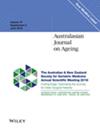Creative engagement and well-being: Older Chinese migrants in New Zealand
Abstract
Objectives
This study explored the forms and motivations of older migrants' creative engagement in the host country in their daily context, and how the engagement influences older migrants in their postmigration life.
Methods
A qualitative approach was used by conducting in-depth interviews and photo elicitation with 18 older Chinese migrants in New Zealand. Data were coded using a hybrid approach of deductive content analysis and inductive thematic analysis.
Results
Four types of creative engagement were identified: nature (gardening), art-making (e.g. making vlogs and painting), handcrafts (knitting and carpentry) and creative writing (journaling). Gardening, as the most popular activity, helped link participants' past to their current life. Some participants used digital tools (e.g. mobile phones) to develop their creative skills. Respondents reported that migration-related stress (e.g. language barriers and a limited social network) contributed to their having constrained lives, which meant that they had more spare time for creative pursuits. Participants' life histories influenced their choice of pursuits. Finally, participants indicated that creative activities helped alleviate stress and contributed to their adjustment to life in the host country and to sustaining their well-being. Those who did not engage in creative pursuits attributed it to their personal life histories (e.g. deprivation of education) and postmigration commitments (e.g. caregiving responsibilities).
Conclusions
Postmigration challenges do not necessarily discourage older migrants from creative pursuits, but instead they may shape the type of pursuit chosen and the form of engagement. Previous life experiences also affected the choice of creative pursuits in later life. These creative engagements appear to help sustain older migrants' postmigration well-being.


 求助内容:
求助内容: 应助结果提醒方式:
应助结果提醒方式:


